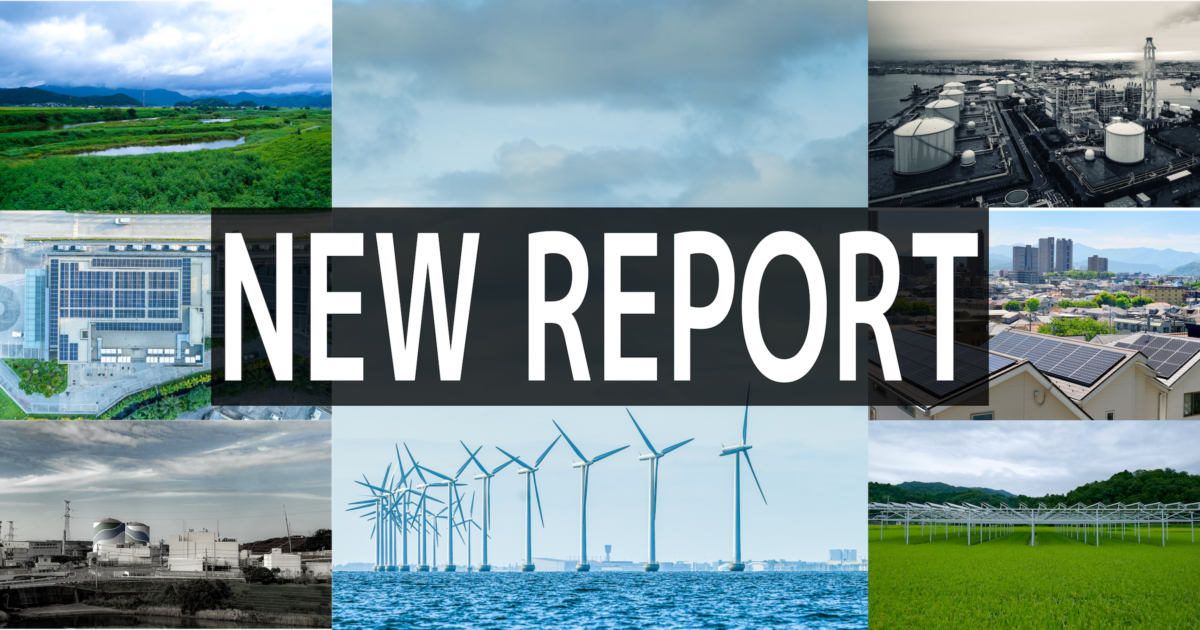
Climate Integrate today released “Decarbonizing Japan’s Electricity System: Policy Change to Trigger a Shift” (download), which contains policy recommendations needed to achieve the decarbonization of Japan’s power sector. This report was released simultaneously with “The 2035 Japan Report: Plummeting costs of solar, wind and batteries can accelerate Japan’s clean and independent electricity future” (download) by Lawrence Berkeley National Laboratory (Berkeley Lab).
Decarbonization of the power sector by 2035 is an important milestone to achieve net zero, which Japan agreed at the G7 Summit last year. Expanded use of renewable energy in Japan, which relies on fossil fuel imports for about 80% of electricity generated, would be beneficial in terms of reducing electricity costs, boosting energy security, and reducing greenhouse gas emissions.
In “2035 Japan Report” Berkeley Lab uses the latest models to examine the economic feasibility of a shift to renewable energy in the electricity sector. As summarized below, the report shows that it is possible for Japan to shift to a decarbonized electricity sector by 2035, without the need to build new thermal (fossil fuel) or nuclear power plants, by significantly increasing the share of renewable energy.
Summary of findings from “The 2035 Japan Report”
・Due to the decreasing costs of solar, wind (especially offshore) and battery technology, Japan can achieve a 90% clean electricity share by 2035 (“The Clean Energy scenario”).
・This would also result in a 6% reduction in electricity costs, nearly eliminate dependence on imported LNG and coal, and dramatically reduce power sector emissions.
・Japan’s power grid will remain dependable without the need for new gas capacity or coal generation.
・To take advantage of these significant economic, environmental, and energy security benefits, strong policies such as a 90% clean electricity target by 2035 and corresponding renewable deployment goals are required.
In its report, Climate Integrate makes policy recommendations on what would be needed to realize the shift to renewable energy as outlined in Berkeley Lab’s Clean Energy Scenario.
Summary of “Decarbonizing Japan’s Electricity System: Policy Changes to Trigger the Shift” by Climate Integrate
To realize Berkeley Lab’s scenario, the government of Japan would need to make significant changes in overall policies and strengthen and redirect its policy measures. Climate Integrate’s recommendations present three components of a national vision and seven sets of policy measures necessary to realize the scenario.
National vision
1. A grand design centered on shift to renewables
2. Ambitious targets and policy review
3. National strategies for a just transition
Policy measures
1. Making carbon pricing more effective
2. Expanding renewable energy in ways that benefit communities
3. Enhancing flexibility in Japan’s power system
4. Redesigning power markets to encourage fair competition
5. Boosting offshore wind development
6. Improving energy efficiency
7. Using fiscal measures to support the energy shift
Comments
Kimiko Hirata, Executive Director, Climate Integrate said: “Berkeley Lab’s Clean Energy Scenario shows that decarbonization of electricity in Japan can be achieved through the widespread promotion of renewable energy. This is very different from the direction the Japanese government is currently going with Green Transformation (GX), such as ammonia and hydrogen co-firing at thermal plants, and an extension of the service life of nuclear power plants. The barrier is not technology or cost, but policy. If policies change and provide clear signals, adequate incentives and support, we can be much closer to realizing this path.”
Links to reports
Lawrence Berkeley National Laboratory: “The 2035 Japan Report”
Climate Integrate: “Decarbonizing Japan’s Electricity System: Policy Changes to Trigger the Shift”
・Lawrence Berkeley National Laboratory
Founded in 1931, Lawrence Berkeley National Laboratory and its scientists have been recognized with 16 Nobel Prizes. Today, Berkeley Lab researchers develop sustainable energy and environmental solutions, create useful new materials, advance the frontiers of computing, and probe the mysteries of life, matter, and the universe. Scientists from around the world rely on the Lab’s facilities for their own discovery science.
Berkeley Lab has previously published results on the decarbonization of power systems in the United States (2020), India (2021) and China (2022). This report is the latest in a series of studies. A study on Korea is also to be published.
An independent think tank based in Tokyo that aims to accelerate policy shifts and actions to protect the climate. Established January 2022.
Contact
Climate Integrate
TEL: 03-6453-7570
Email: contact@climateintegrate.org


